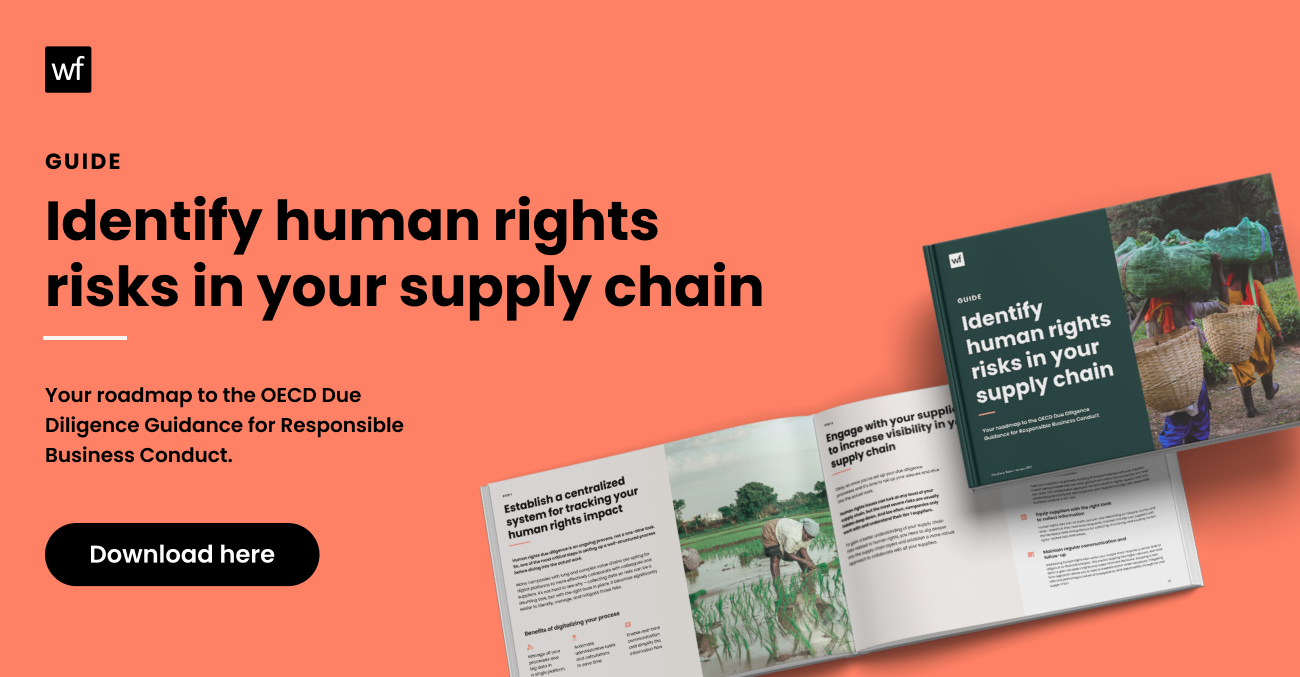All you need to know about France's Corporate Duty of Vigilance law

What is the French Corporate duty of vigilance law?
France’s Corporate Duty of Vigilance law (Loi de Vigilance) requires large companies in France to effectively manage their human rights and environmental risks – both within the company itself, but also its subsidiaries, subcontractors and suppliers. The law requires the company to establish, implement and publish its own vigilance plan corresponding with the UN’s human rights due diligence procedure outlined in the Principles on Business and Human Rights (UNGPs).
In 2017, France was the first country in the world to adopt a law obligating large companies to carry out human rights and environmental due diligence (HREDD) and publish a Vigilance Plan annually. The law, known as The French Corporate Duty of Vigilance Law, or The French Loi de Vigilance, was adopted to ensure that companies are taking the measures needed to identify and prevent human rights and environmental violations in their supply chains – and prevent “tick-box” due diligence culture once and for all.
Which companies are covered under the French Corporate Duty of Vigilance law?
According to the legislation, companies are required to comply if they meet the following criteria:
-
Are established in France and;
-
At the end of two consecutive financial years employs at least 5.000 employees in the company and its french-based subsidiaries or;
-
Have at least 10.000 employees in the company and its subsidiaries in France and other countries.
How to comply with the Vigilance Plan law?
Ultimately, the law's ambition is to prevent corporate abuses by obligating companies to set out effective measures of vigilance by establishing, implementing and publishing a Vigilance Plan in line with the UN’s human rights due diligence procedure.
The Vigilance Plan should explain what measures your company has implemented to identify and prevent human rights and environmental violations associated with your company’s activities. These activities include:
- the company's own activities;
- the activities of the company’s subsidiaries;
- The suppliers’ and subcontractors’ activities which are directly and indirectly linked to the company through their commercial relationship/agreement.
What to include in the Vigilance Plan:
- Risk mapping: identification, analysis and ranking of potential risks;
- Steps implemented to address, mitigate and prevent risks and violations;
- Outline of procedures implemented for periodically assessing the company’s subsidiaries, subcontractors and supplier’s compliance;
- A method for identifying existing or potential risks in cooperation with relevant trade unions;
- (newly added) A monitoring scheme to follow up on the measures implemented and assess their efficiency.
What happens if you don’t comply?
If a company covered by the law fails to comply – i.e failing to implement and publish their Vigilance Plan – any concerned parties (such as victims of corporate abuses) can file a complaint with the relevant jurisdiction.
A company is given a three-month period to meet its obligations after receiving a formal notice to comply with the law. If the company still fails to meet the obligations after the notice period is over, the company can be granted to publish a plan on what measures the company will take to ensure compliance in the future. Then, the judge decides when and whether the vigilance plan is complete and appropriately fulfills the obligations.
Companies failing to publish plans can be fined up to 10 million EUR. In addition, if the failure to act results in damages that would otherwise have been preventable, fines can reach up to 30 Million EUR. So don’t postpone your compliance until it’s too late – set up your Vigilance process today!
More corporate due diligence laws are on the horizon
Ever since France implemented their HREDD law, governments adopting human rights and environmental due diligence legislations have skyrocketed – especially on the European continent. What’s more, the European Commission announced in 2021 that they would adopt their own directive on mandatory supply chain due diligence for all companies operating within the EU – which will most likely enter into force already in 2024. One thing is certain: if companies want to flourish, or even survive in the future market, establishing a human rights due diligence process that meets the legal requirements is a must!
How Worldfavor can help
Establish and implement your Vigilance Plan in Worldfavor to quicker, more accurately and smoother map and identify risks. Worldfavor enables greater visibility to a company’s true risk exposure through automated risk analysis. Worldfavor’s risk assessment is based on the UN’s Human Rights Due Diligence procedure, so you can ensure you’re fulfilling the Vigilance Plan obligations. Reach out to us and we will tell you more on how your company can benefit from Worldfavor’s sustainability platform.
Some benefits of using Worldfavor to comply with the Duty of Vigilance law include:
- Eliminate manual tasks and human error – Worldfavor automates your risk assessment process in accordance with the OECD and UNGPs guidelines
- Collect all the data you need from suppliers seamlessly and automatically transform your findings into actionable insights
- Quickly spot hidden risks in your supply chain
- Identify, mitigate, and prevent risks. Track and review your process over time in your own dedicated dashboard
-
Easily communicate your process and findings publicly. Export and share your information externally in a standardized format. Just like your stakeholders want it.
Related blog post you might like:






%20as%20the%20deadline%20approaches.%20Learn%20about%20compliance%20requirements%2c%20potential%20delays%2c%20and%20key%20updates..png)

